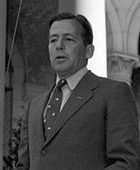Rationale for Inclusion
- Founder of Douglas Aircraft Company: Donald Wills Douglas Sr. founded the Douglas Aircraft Company in 1921, which would become one of the most important and influential aircraft manufacturers in history. Under his leadership, Douglas Aircraft produced some of the most iconic and groundbreaking aircraft, significantly shaping both the military and commercial aviation industries.
- Revolutionizing Commercial Aviation: Douglas was instrumental in revolutionizing commercial aviation. His design of the Douglas DC-3, introduced in 1935, changed the face of air travel. The DC-3 became the first aircraft to make commercial airlines profitable without government subsidies. Known for its reliability, efficiency, and range, it set the standard for commercial airliners and became one of the most significant aircraft in aviation history, helping to popularize air travel globally.
- Pioneering the Jet Age: Douglas continued to lead in aviation innovation during the advent of jet propulsion. His company developed the Douglas DC-8, one of the first commercially successful jet airliners, which debuted in 1958. The DC-8 marked Douglas’s entry into the jet age.
- Leadership in Commercial Aircraft Development: Douglas’s leadership resulted in the development of several influential commercial aircraft, including the Douglas DC-4, DC-6, and DC-7, which helped expand international air travel in the post-World War II era. These aircraft were known for their safety, range, and ability to carry more passengers, paving the way for global airlines to extend their reach.
- Commitment to Aviation Safety: Throughout his career, Douglas was deeply committed to improving aviation safety. His aircraft were known for their reliability, which helped build public confidence in air travel. This focus on safety and durability was a hallmark of Douglas’s approach to aircraft design, contributing to the long-term success of his planes in both commercial and military applications. His contributions to safety protocols and engineering standards have had a lasting impact on the industry.
- Enduring Legacy in Aviation: Donald Wills Douglas Sr.’s legacy extends far beyond his own lifetime. The Douglas DC-3 is still regarded as one of the most iconic aircraft ever built, and his company’s contributions to both commercial and military aviation have had a profound and lasting impact on the industry. The company he founded, which later became part of McDonnell Douglas, and eventually merged with Boeing, remains a critical player in the aerospace industry. His innovations continue to influence aircraft design and air travel to this day.

Biography
- Early Life and Education: Donald Wills Douglas was born on April 6, 1892, in Brooklyn, New York. He attended the U.S. Naval Academy but left before graduation to follow his passion for aviation. He soon enrolled at the Massachusetts Institute of Technology (MIT), where he earned a degree in aeronautical engineering in 1914. Douglas was one of the earliest graduates in this field, setting the stage for his groundbreaking career in aircraft design.
- Personal Life: Donald Douglas married Charlotte Marguerite Douglas, and they had three children together. Known for his reserved and hardworking nature, Douglas remained dedicated to both his family and his career throughout his life. He was deeply committed to advancing the aviation industry and often worked tirelessly to improve aircraft design and performance.
- Early Career: Donald Douglas began his aviation career during World War I, working as a chief engineer for the Glenn L. Martin Company, where he designed military aircraft. In 1920, he founded his own company, the Douglas Aircraft Company, in Santa Monica, California.
- In recognition of his service to aviation Douglas received numerous awards and accolades, including:
- Induction into the International Air & Space Hall of Fame (1967)
- Induction into the National Aviation Hall of Fame (1969)
- Receipt of the Daniel Guggenheim Medal (1939)
- Receipt of the Tony Jannus Award (1966)
